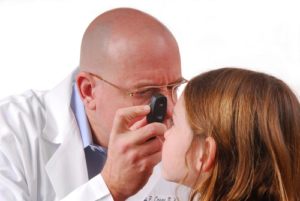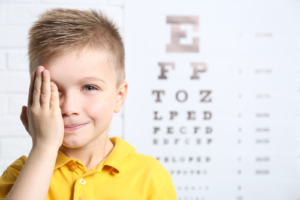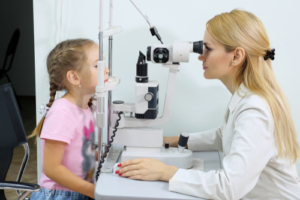Is a Vision Screening the Same as a Pediatric Eye Exam?
Did your child receive a vision screening at school? Although they may seem similar, vision screenings differ from eye exams.
While vision screenings are more basic and a way of quickly checking a child’s eyes, pediatric eye exams are far more thorough. Both are important for children.
With the help of regular vision screenings and eye exams, your child can acquire an early diagnosis for any existing vision and eye problems, leading to more effective treatment.
Keep reading to learn more about vision screenings and pediatric eye exams.
What is a Vision Screening?

A vision screening is a relatively short test done by a pediatrician, trained technician, or nurse during routine checkups. It can also be performed at school by a trained nurse.
A vision screening can detect refractive errors like farsightedness and nearsightedness. They can also help monitor your child’s development and detect vision problems sooner.
If a problem is detected during a vision screening, you and your child will be referred to an optometrist or ophthalmologist for a comprehensive eye exam.
Why and When Your Child Needs a Vision Screening
As per the American Association for Pediatric Ophthalmology and Strabismus and the American Academy of Ophthalmology, your child’s vision screening schedule should be as follows:
At Birth

Your child will receive their first vision screening at the hospital soon after birth. A doctor or other trained health professional will inspect your newborn’s red reflex, pupil, and blink response.
The red reflex is a reflection of light from the lining inside the back of the eyes. It makes pupils appear red in photos.
If the bright light shined in the eyes during a red reflex test doesn’t reflect red, your child may require additional tests.
6 to 12 Months
Your child should receive their next vision screening between 6 to 12 months at their well-child exam. A pediatrician should perform these checks in addition to the same tests done above:
- Eye alignment
- Visual tracking
- Visually inspecting the eyes
One to Three Years
Between 12 and 36 months, your child will have their eyes checked for healthy development during another vision screening. Also done at the pediatrician’s office, the screening involves:

- A photo screening test to help find issues that can cause lazy eye
- Checking for healthy eye development
If there are any noticeable problems, your child may get referred to an ophthalmologist for further testing.
Three to Five Years

Between 3 and 5, your child should see a pediatrician, family doctor, ophthalmologist, orthopist, or optometrist for eye and vision alignment. They should have their visual acuity tested once they can read an eye chart.
Your child should see an ophthalmologist if their vision screening shows signs of strabismus, amblyopia, refractive errors, or other focusing problems. Early treatment will help ensure the long-term protection of their vision.
Five Years and Up
Once your child turns five, they need visual acuity and alignment screening.
Children should have frequent screenings:
- To determine if they are at high risk for an eye problem and need a comprehensive eye exam
- To detect and address eye problems as early as possible. This is crucial to your child’s eye and vision health, overall well-being, and healthy development.
- To learn vital information about your child’s eye and vision health
Remember, the sooner pediatric eye conditions are diagnosed, the better the treatment outcome. If your child fails a vision screening, they’ll need a comprehensive eye examination.
But sometimes, you may be referred to an optometrist even when your child passes a vision screening. That can be the case if your child has the following:
- Learning disabilities that are suspected to be caused by an undiagnosed visual disorder
- Specific visual behavior, like an eye that appears to wander, drift, or cross
- School performance issues that may be linked to an undiagnosed vision problem
What is a Pediatric Eye Exam?

A pediatric eye examination is more in-depth than a vision screening. It can determine your child’s exact vision problem, which a vision screening cannot.
With eye exams, ophthalmologists or optometrists can diagnose eye movement disorders and sight-threatening conditions like amblyopia and retinopathy of prematurity. The exam can last between 30 to 60 minutes. It includes dilating your child’s eyes, plus a detailed evaluation of the following:
- Refractive errors
- Visual acuity
- Eye alignment
- Color vision
- Depth perception
- Visual field
- Eye movement and tracking
- The health of all ocular structures
Why and When Your Child Needs an Eye Exam
Your child will require a comprehensive eye exam if they:
- Have been referred by a pediatrician or school nurse
- Failed a vision screening or the vision screening was inconclusive
- Showed signs of refractive errors, lazy eye, misaligned eyes, or another focusing problem during their vision screening
- Are at a higher risk of specific vision problems due to a medical condition like pediatric cataracts or a family history of vision issues
- Have developmental delays, behavioral issues, or a neurological disorder
It’s also important to be on the lookout for the following signs that could indicate your child needs an eye exam:

- Infants 3 months or older whose eyes are not tracking
- Short attention span
- Covering one eye
- Holding reading materials close to the face
- Frequent eye rubbing
- Squinting
- Sensitivity to light
- Excessive blinking
- Poor hand-eye coordination
- Different pupil sizes
- Losing place when reading
- Fast eye fluttering
- Excessive tearing
- Tilting head to read
If your child has these signs, don’t wait until their next wellness visit. Book an appointment with an eye doctor to get to the bottom of the problem.
Poor vision can lead to delays for young children. But with the aid of an eye doctor, you can treat many vision issues successfully.
Pediatric Eye Exams at Eye Consultants of North Dakota
Children may not know when something is wrong with their eyes. Yet healthy eyes are essential for proper growth and development.
Pediatric eye exams at Eye Consultants of North Dakota can provide a clear picture of your child’s vision and eye health and help keep their eyes healthy. Want to ensure your child’s vision stays healthy?
Start by scheduling an appointment at Eye Consultants of North Dakota in Fargo, ND!



